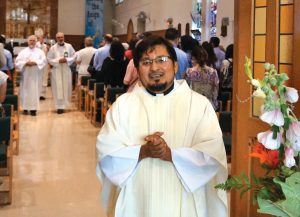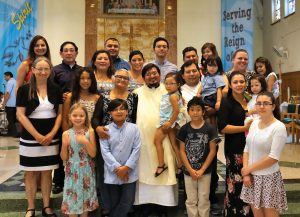Called to love
By Fr. Luis Lopez, S.F.M.
January-February 2016

Fr. Luis Ramon Lopez was ordained a Scarboro Missions priest on July 11, 2015, by Bishop Wayne Kirkpatrick, Auxiliary Bishop of the Archdiocese of Toronto. Fr. Luis is serving in Guyana along with Fr. Mike Traher and three Scarboro lay missioners. (Photos by Roy Sakaguchi)
On July 11, 2015, I was ordained a priest with Scarboro Missions. It was the end of one part of my journey, a journey that took 11 years of faith and hope. Throughout that time I experienced many joys and challenges in my desire to answer the call that I felt God was giving me. I was being called to love my brothers and sisters, no matter who they are or where they may be.
I was born in El Salvador in a time of violence and chaos. Out of that chaos, Archbishop Oscar Romero came forward and blossomed into a voice of hope and love for the Salvadoran people and for the poor of the world. I grew up hearing about his life and death. He was willing to sacrifice all for the ones who did not have a voice, for the ones who did not matter in the eyes of many. In 1984, my sister was killed by the Salvadoran army at the age of 17. She died following Jesus and trying to make her country a better place.
Finding my own place

Fr. Luis’s mother, Maria Lopez (above centre), led a large family delegation (mainly from the Ottawa area) to attend this happy occasion. The Scarboro Missions chapel and reception were overflowing with friends and relatives. He celebrated his first Mass in the chapel the following morning.
My family immigrated to Canada in the 1980s when I was 12 years old and I was given opportunities that I would not have had in El Salvador. Canada has given me so much that in time I felt the need to give back. Growing up in Canada I also struggled to find my place in the midst of two cultures, two languages, and the feeling that I belonged to neither one nor the other. The first question people ask me in Canada is where are you from. They ask the same question in El Salvador when I visit. My Spanish is no longer like theirs, so they assume I was born in another Latin American country. All of these experiences have allowed me to find my own place in a world that is not always kind to the outsider or to the one who does not fit into a predetermined mold.
My vocation has taken me to live in Cambodia, a place that I love, where I learned so much about myself and that being Catholic is not the only way to have a relationship with God. My faith is mine and it allows me to see God in my life and my world, but it is not the only way to know God. It is a humbling experience discovering that God is so much bigger than we can imagine or know.
What it means to be a priest
All of these experiences have shaped my understanding of what it means to be a priest and my understanding of vocation. A priest is someone who leads but does not tell people what to do, thus allowing them to see their own gifts and blossom into true followers of Jesus at their own pace.
“As a priest I am called to love so that others may see God’s love in their lives, because ultimately our faith is about love.”
As priests, we go through the same journey as lay people. As a priest I bring the sacraments to others, but more importantly I share my life with them. As a priest I am called to love so that others may see God’s love in their lives, because ultimately our faith is about love. Jesus came into the world and gave his life out of love for all humanity. We are called to follow that love and that example and to be true to who God is calling us to be.
Our calling comes from God. It is not that God will touch us on the shoulder and say, “This is what I want you to do.” But each life experience and every person we meet or hear about are opportunities to better understand our calling. We discover the best way to live our vocation of loving the other by exploring our experiences and deepening them through prayer, conversations, or simply by sitting with them and allowing them to speak to us. My discernment has come through my art (painting), spiritual direction, and prayer. Take time with these experiences and they will reveal the path to follow.
If we approach our life experiences as doors and windows to new possibilities, then any experience can help us to see where and who God is calling us to be. Ultimately our vocation comes to us when we live our lives as people of love, as people who follow Jesus. Whether we are a priest or religious, single person, husband, wife, parent, or child, whatever our profession or occupation, our vocation is to love one another. Jesus did not come to build an institution but to show us how to love and care for one another no matter what we do, who we are, or where we are. That is our vocation. It is a call to all of us.∞
